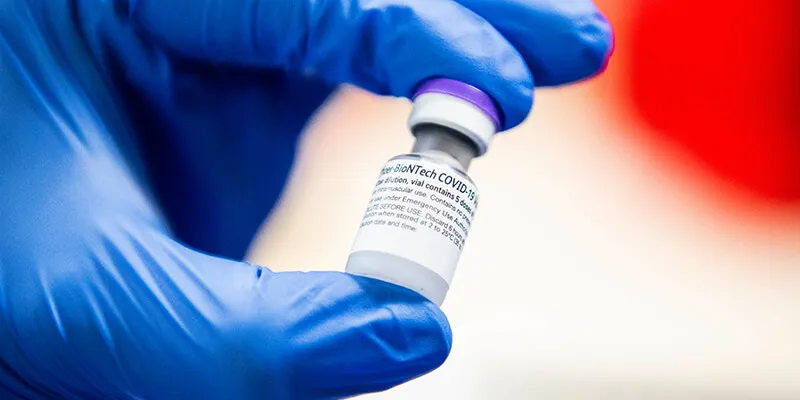With the finish line in sight to this unprecedented year, 2020 delivered one final surprise mid-December: something to celebrate. The release of a truly historic vaccine now puts hope in the hands of healthcare workers around the world — and Vermont is no exception. Just days after the vaccine’s FDA approval, UVM Medical Center administered the first doses of the vaccine, marking the beginning of the end of the coronavirus pandemic. What follows is the start of our arch toward better days ahead.
The most anticipated unboxing of the year. Monday, December 14, The UVM Medical Center, like hospitals around the country, received the first doses of the Pfizer/BioNTech vaccine, just days after it received emergency use authorization from the FDA. “We have been hoping and waiting for this historical moment where we have vaccine available for the most vulnerable members of our community and our frontline medical workers,” said Kristin Baker, emergency department nurse manager.
After healthcare workers put their lives on the line to keep others protected, “it’s with great gratitude that we can now return that favor and do something to keep them safe,” said UVM Medical Center CEO Dr. John Brumsted. With these vaccinations, “we mark the beginning of the end of this terrible pandemic.”
History made. Tuesday, December 15, emergency department nurse Cindy Wamsganz, RN, was the first person in the State of Vermont to receive the vaccine. Wamsganz said she was “humbled and honored” to get the first shot. Following Wamsganz, several frontline workers received the vaccine, including medical center staff and first responders.
Friday, December 18. UVM nursing students Gillian Eppler ’21 (pictured here, left) and Nicole Sampson ‘21 are on their winter break. “These guys could be sitting at home, chilling with Netflix — but they're not,” says their professor, Rosemary Wosky. Instead, they volunteered to help out with the COVID-19 vaccination underway now at the UVM Medical Center.
Kristin Baker, RN, takes a vaccine selfie to share with friends on social media. The students have been here since 6:30 a.m., taking turns checking in frontline health care workers who have been coming — six at a time, every ten minutes — to get the first of two doses of the Pfizer vaccine. “One of us points to which nurse they should go see — there are six stations right now — while the other checks paperwork, making sure everybody has reviewed the fact sheet,” explains Eppler.
“We’re part of public health history as it happens,” she says. Living through the COVID-19 pandemic has made her more interested in a career in public health, and think about how much other people do — or don’t — take notice of the work of nurses. “More now, but not enough,” she says. “And for my own studies, it’s a drive to continue in that final push through senior year. You want to get done and start helping people.”
Nicole Sampson (pictured left) is pondering a specialization in cardiology. She came to this all-day volunteer assignment because: “It’s such a huge moment for humanity,” she says. “It’s been pretty crazy for all of us. Hopefully this vaccine will totally change the course of the pandemic.” Sampson points a pediatric nurse to where she should get her shot, at the front of the Davis Auditorium, now a makeshift clinic. “I’m going to look back and be like, ‘yeah, I was helping out.’ It’s really cool to be, for the first time, on the medical provider side, instead of the consumer.”
Photos by Josh Brown, Ryan Mercer, and courtesy of the University of Vermont Medical Center. Video by Ryan Mercer.
